Spoiler Warning: Mention of the plot
The Great Indian Family directed by Vijay Krishna Acharya follows the life of Ved Vyas Tripathi (called Billu by his family) played by Vicky Kaushal and his subsequent identity crisis when he discovers that he is Muslim by birth. Pandit Siyaram (Billu’s father, played by Kumud Mishra) is initially given the wedding contract of Malpani’s daughter but Jagannath Mishra and his son, Tulsidas (rival pandits to the Tripathis) enter the scene, determined to steal the contract from him. Following this, Billu receives a letter that informs him that he was born a Muslim while his father is away on his annual pilgrimage.
The Mishras get wind of the letter and start a social smear campaign against Billu questioning his credentials as a pandit. When Billu decides to convert to Islam to make sure his family doesn’t lose their livelihood as pandits, his father returns in time to stop him. Siyaram makes it clear to Billu that he was aware that he was Muslim by birth but that doesn’t change the fact that he’s his son at all. The movie concludes on a heartwarming note with an emotional monologue by Billu in front of the entire town, father-son sentiments and wishful ideas of secularism.
How important is the accident of birth in religion?
The central question of The Great Indian Family seems to be whether one’s birth determines their religion or if it is up to them to choose. In Hinduism, especially for Brahmins who perform rituals, purity is of utmost importance. Additionally, a son inherits his father’s caste and his caste-determined profession as his own.
We see the same happening in The Great Indian Family where Billu takes up the profession of being a pandit with his father. He doesn’t seem to think that his life could take any other path at all. His only complaint about his pandit life is that it’s hindering his dating life.
Life is pretty sweet for Billu as the legitimate son of a revered pandit; his purity and his right to perform rituals or sing at temple events are never in question. Be it saying ‘Jai Shri Ram,’ and not stopping at a police checkpoint or thinking that ‘Allahu Akbar,’ is how Muslims greet each other, Billu is every bit the privileged, entitled and ignorant upper-caste Hindu.
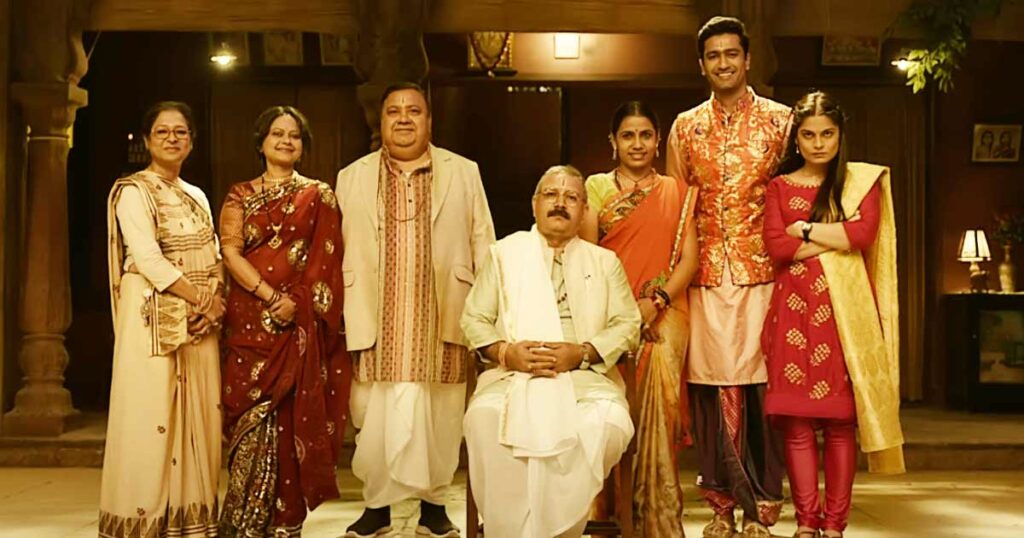
However, when it’s discovered that he’s Muslim by birth, his upbringing as a pandit is dismissed entirely and all everyone seems to care about suddenly is that he might be Muslim. Billu himself is very thrown by this discovery because just yesterday, he was scared to enter the Muslim part of town and now he was he was part of the same community.
Vicky Kaushal gives a very convincing performance as Billu during all the parts where he’s struggling with his religious identity. In one particular scene, Billu declares to his love interest, Jasmeet (played by Manushi Chhillar) that he’s ashamed of his past self for how he thought of and behaved around Muslims. From the beginning, the film portrays Billu and his friends as ignorant Hindus but it’s this admission of bigotry from Billu that makes him a flawed but sincere character.
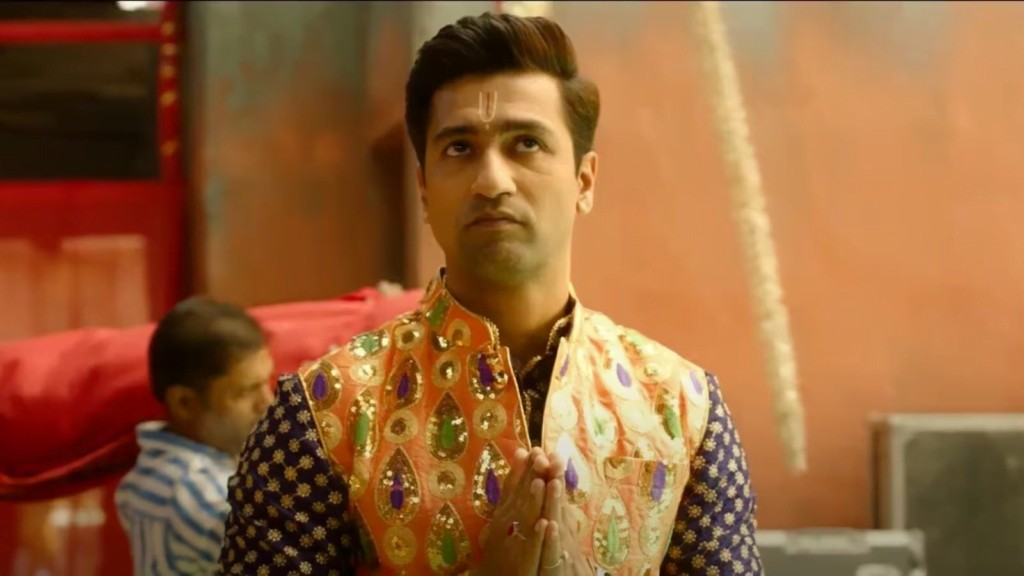
As Billu’s identity crisis gets out of hand and the entire town wants to know if he’s Muslim or Hindu, he answers the town and the film’s central question in one sweep. He says his blood is red like any other’s, essentially saying that his so-called Muslim blood doesn’t matter because he, as an individual with a choice, chooses to be Hindu.
The Great Indian Family gives us a message of how religion mustn’t be determined by the accident of birth but by an individual’s choice and that’s the only way it’s supposed to be in a truly secular country.
Billu’s views are of course, simplistic and reductive of very real religious tensions between the Hindu-Muslim community (you can’t just eat at a Muslim household and toot your own horn about being secular). The film constantly exaggerates Billu’s ignorance which in turn helps in excusing his views but it’s important to note that what Billu does is less than the bare minimum.
It’s also noteworthy that ‘The Great Indian Family,’ doesn’t fall into the usual tropes of linking religion to nationalism or patriotism. The film manages to retain its sincerity because it speaks about a small neighbourhood and keeps talking about how that small neighbourhood can be more secular. The film’s messaging makes us view Hinduism, not as an unbreakable cycle linked with one’s caste, karma and so on but a fluid identity which only takes into account one’s faith in God.
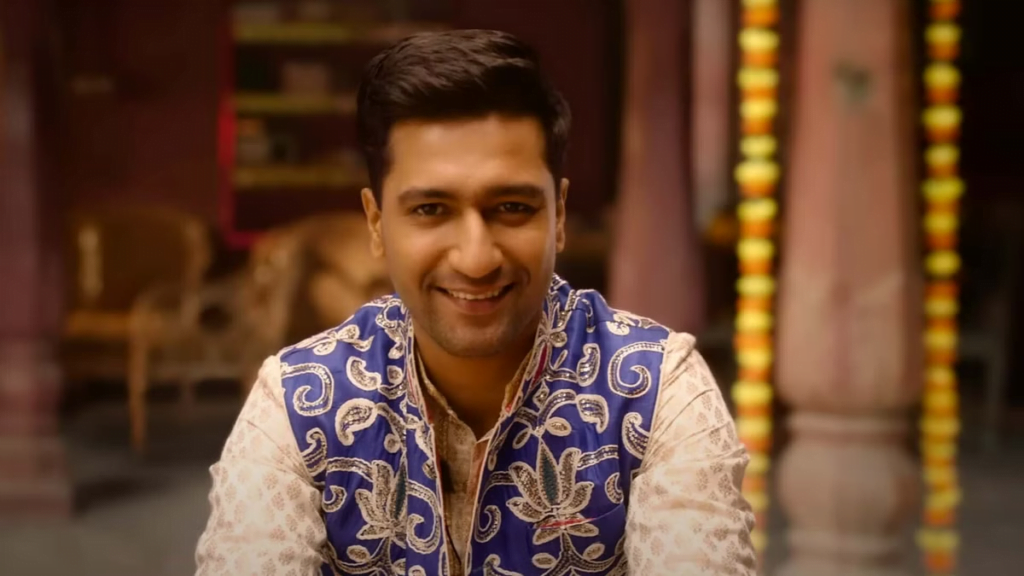
For instance, Billu refuses to accept the rigid definition of the society’s Hindu; he declares that he can be a pandit, eat food at his Muslim friend’s house and be in love with a Sikh girl. He insists that these things don’t have to be mutually exclusive.
Billu’s views are of course, simplistic and reductive of very real religious tensions between the Hindu-Muslim community (you can’t just eat at a Muslim household and toot your own horn about being secular). The film constantly exaggerates Billu’s ignorance which in turn helps in excusing his views but it’s important to note that what Billu does is less than the bare minimum.
In many ways, the film caters to portraying the supposed magnanimity of Hindus with a benevolent Hindu man willingly adopting a Muslim child to boot. Sure, it’s a comedy but when will Bollywood stop just appeasing minorities on the surface and take steps to represent them in a better manner?
We should hold ourselves accountable and do better. While seeing that level of tolerance and coexistence on screen is heartwarming, one can’t help but think that the director has played it very safe with the narrative.
Why didn’t The Great Indian Family show Billu wanting to convert to Islam? What will be his family’s reaction if that’s what he wants? Or why didn’t the director write a story where a man is born Hindu but raised Muslim and chooses to stay Muslim? What was the need for a token Parsi doctor in the flashback?
In many ways, the film caters to portraying the supposed magnanimity of Hindus with a benevolent Hindu man willingly adopting a Muslim child to boot. Sure, it’s a comedy but when will Bollywood stop just appeasing minorities on the surface and take steps to represent them in a better manner?
The devil’s in the details of The Great Indian Family
The Great Indian Family deals with significantly heavy themes in a light-hearted manner but it’s the little details in the film that makes certain that it doesn’t come off as insincere. One of the details that was especially sharp was how a Muslim man plays the character of Kumbhakarna every year during Ram Leela because he simply enjoys acting. This little detail helps him from being viewed as ‘the other,’ and it promotes the film’s bigger message of how one’s religious identity can be as fluid as one wants it to be.
Furthermore, it’s a sociological fact that almost every Indian city and town has designated Muslim and Christian neighbourhoods. Even in so-called metropolitan cities, the rigid segregation found within is all but an open secret. ‘The Great Indian Family,’ does a good job of portraying this reality despite its comical setting.
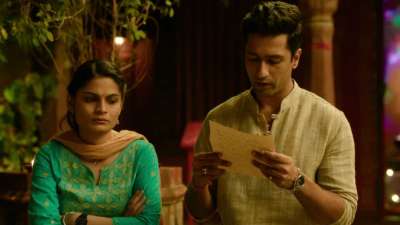
When Billu crosses that invisible line and lives in the Muslim neighbourhood in the second half of the film, he discovers that Muslims are not that different from him at all. They might dress differently and speak a different language but it was both funny and heartbreaking to watch Billu discover that they eat the same way he does and they eat vegetarian food too, just like he does.
While The Great Indian Family might have done a good job in portraying religion in a manner where it doesn’t immediately raise people’s hackles, it does miss its mark with other things. For instance, we have no idea why Billu believes the letter he receives to be true right off the bat or why Jasmeet suddenly falls in love with Billu for no good reason.
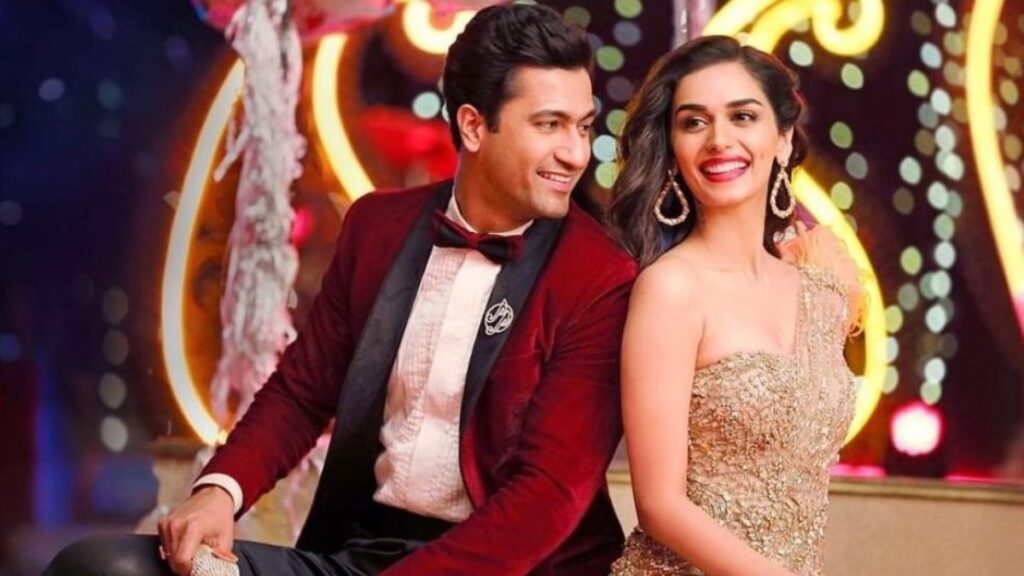
Furthermore, Jasmeet’s character is all but a token Sikh in the film even though it was fun to see a woman incapacitate three men with pepper spray. It also could have done without the snakes and ladders metaphor that seemed to serve no purpose at all.
With all that said though, one of the things that the film nailed is the relationship between Siyaram and Billu. In the scene where Siyaram drives in on a scooter to take Billu back from the Muslim neighbourhood, he could’ve been shown as an angry father dragging his son back but they chose to show a gentle father taking his lost child’s hand. Nuances like this made their onscreen relationship a treat to watch.
Overall, The Great Indian Family comes off as charming and wholesome in its smallness but a truly conscious audience will never be satisfied with it because we know we still need to do better.
About the author(s)
Sharanya Gopalakrishnan is a recently graduated journalism student from Flame University. She
loves reading and watching cringe TV shows. She hopes to publish her own novel someday.
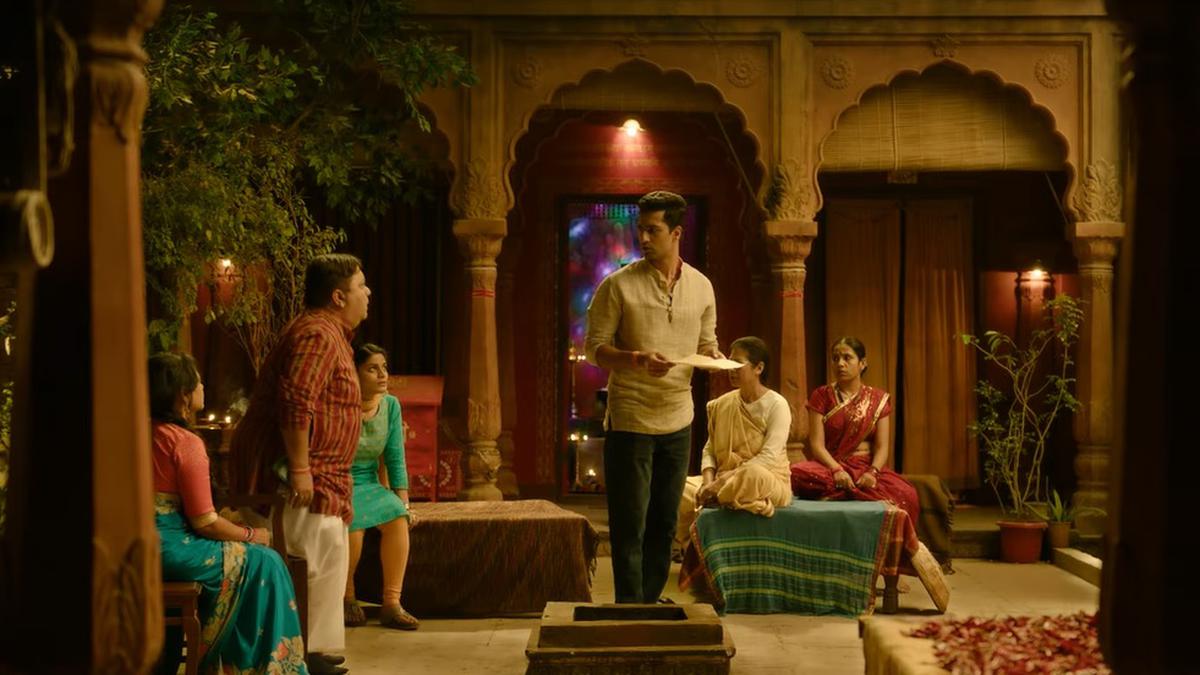





So muslims don’t live differently than us ,what about half of the jail cells are filled with muslims